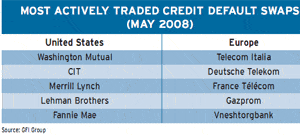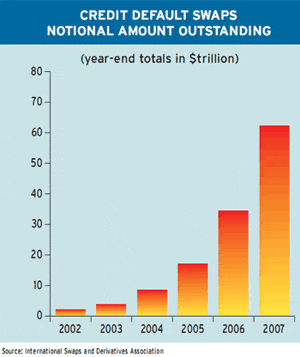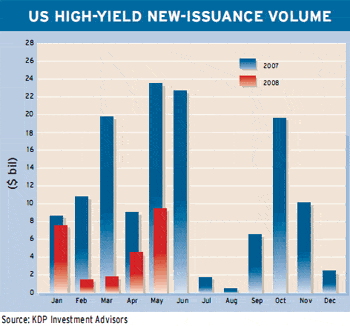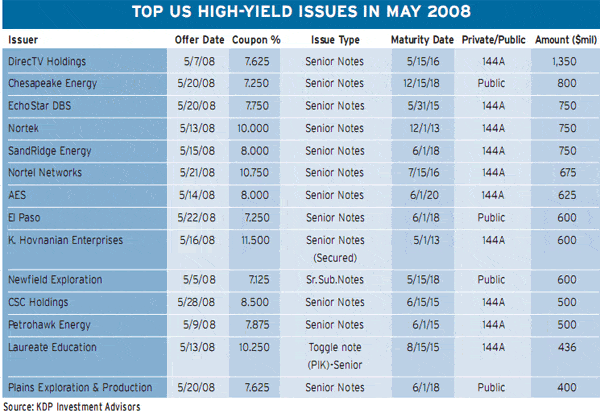CORPORATE DEBT
 A consortium led by major investment banks active in the huge over-the-counter derivatives market in credit default swaps (CDS) plans to launch a central clearinghouse by September in an effort to reduce counterparty risk in the financial system. Such risk arises from the danger that one party in a trade will be unable to meet its obligations.
A consortium led by major investment banks active in the huge over-the-counter derivatives market in credit default swaps (CDS) plans to launch a central clearinghouse by September in an effort to reduce counterparty risk in the financial system. Such risk arises from the danger that one party in a trade will be unable to meet its obligations.
The Clearing Corporation (CCorp), based in Chicago, has signed an agreement with the New York-based Depository Trust & Clearing Corporation (DTCC) to deliver central counterparty services to the CDS market, a largely unregulated market in contracts that offer protection against corporate defaults.
Credit default swaps are the most widely traded credit derivatives, with an estimated $62.2 trillion notional amount outstanding at the end of 2007, up from $2.1 trillion five years earlier, according to the International Swaps and Derivatives Association.
A CDS is an agreement between two counterparties, typically for five years, in which the buyer makes periodic payments to the seller in return for a promised payoff if a third party defaults. The cost of such protection against default has risen sharply as a result of the global credit crunch, as well as the growing risk of corporate defaults in a weakening economy.
Potential Systemic Risk
Moody’s Investors Service said in a report released in late May that counterparty risks in the CDS market pose greater potential threats to banks and dealers than other OTC derivatives, such as interest rate swaps. While banks can spread risk around the globe with CDS trades, it is the interconnected nature of the market that could pose a systemic risk to the financial system, according to Moody’s.

“The most significant systemic risk posed by CDS is the effect the failure of a major counterparty, such as a large universal bank or securities firm, would have on the operational integrity and pricing in the markets for CDS and, potentially, the underlying securities, such as corporate bonds,” the rating agency said in its report.
Such counterparty risk was highlighted by the near-failure of Bear Stearns earlier this year. The firm was a major participant in the CDS market.
In May 2005 price swings in the credit derivatives market following the downgrades of Ford Motor and General Motors debt caused hedge funds to lose between $1 billion and $2 billion and raised fears of a wider financial meltdown.
Moody’s says the sheer size of the market does not pose an undue concern in and of itself. The real danger, according to the rating agency, is that if a large counterparty failed, this would cause a major re-pricing throughout the CDS market and depress the prices of the underlying bonds of the companies on which the credit protection is purchased. For actively traded issues, CDS volumes are substantially greater than the outstanding corporate debt.
Contracts Trade Often
When a default occurs, the seller of the protection must take possession of the defaulted bond at par value or pay the buyer the difference between the par value and the recovery value of the bond. CDS contracts often change hands many times, however, and there is no guarantee that the current holder, such as a hedge fund, will have the assets to pay out in the event of a default.
The planned central clearinghouse for CDS trades would pair CCorp’s netting and risk management processes with the asset servicing capabilities of DTCC’s global repository for CDS contracts throughout their lifecycle. As the central counterparty, CCorp would act as a guarantor for the OTC contracts.
“Through the use of multilateral netting, margin collateral and daily marking to market of positions, CCorp’s clearing facility will improve capital efficiency, increase regulatory transparency, lessen direct counterparty risk and reduce systemic risk relating to the multi-trillion-dollar market in credit default swaps,” says Michael Dawley, chairman of CCorp.
Incentive for Banks
The clearinghouse will be open to all participants that satisfy CCorp’s requirements relating to creditworthiness, a strong capital base and experience in the CDS market. One incentive for banks to join the netting initiative is that they would likely have to put up less capital for the central guarantee fund than they now put aside individually to cover potential losses. The arrangement would cut the number of counterparties they would have to deal with.

The plan is to start with CDX North American high-yield and investment-grade indexes. Other CDS products, such as iTraxx indexes, index tranches and single-name products, would be introduced later this year and in 2009.
DTCC’s trade information warehouse is an automated repository for more than 3 million contracts, with more than 10,000 new contracts on average flowing into the warehouse on a daily basis.
Regulators have put pressure on the banks to improve the efficiency of the CDS market and reduce the possibility of systemic risk. Anthony Ryan, assistant secretary for financial markets at the US Treasury department, told financial market participants in a speech on May 1 that OTC derivatives have become important vehicles for hedging and transferring risk. “But as with most financial products, infrastructure development has lagged innovation,” he said. “Market volume and instrument complexity call for a clear, functional, well-designed infrastructure that can meet the needs of the OTC derivatives markets in the years ahead.”
Ryan said changes must be made in market practices, or legislators and regulators would take action. “The industry needs to take further steps to limit the domino effect of lagging and uncertain post-trade processes in the event of a counterparty default or failure,” he said.
The Federal Reserve Bank of New York, the President’s Working Group on Financial Markets, and Treasury secretary Hank Paulson have also called for improvements in the infrastructure of the OTC derivatives market. Senator Charles Schumer, a New York Democrat, sent a letter to regulators last month warning that the unregulated credit derivatives market is capable of posing a devastating risk to the regulated financial system. “We cannot wait for the next crisis before we act to rein in this risk,” Schumer wrote.
The backers for the proposed new clearinghouse include major participants in the CDS market, such as Goldman Sachs, Deutsche Bank and Morgan Stanley, as well as Icap and GFI Group, the two largest inter-dealer brokers. The consortium also includes Creditex and Markit, two electronic CDS trading boutiques.
ICE Acquires Creditex
IntercontinentalExchange (ICE), the electronic commodities exchange, announced in June that it is acquiring Creditex. Jeffrey Sprecher, chairman and chief executive of ICE, said in a conference call, “We built our business as a result of Enron’s collapse and the introduction of straight-through processing, and we see the same opportunities in the CDS market.”

London-based Markit announced on May 27 that it has completed the acquisition of SwapsWire, another electronic trade-confirmation network for the OTC derivatives markets. Jeff Gooch, executive vice president at Markit, says, “The combination of the Markit and SwapsWire trade-processing platforms gives us critical mass and a global network at a time of increased consolidation in the vendor market.”
Backlogs in Confirming Trades
Trade confirmation backlogs in credit derivatives stabilized in the first quarter of this year at around 6,000 trades per dealer per month relative to average monthly trading volume of 25,000 trades per dealer, according to data from Markit. With the markets continuing to grow at a rapid pace, infrastructure will remain a major concern.
Markit acquired SwapsWire from a group of more than 20 banks, including Bank of America, Barclays Bank, BNP Paribas, Citi, JPMorgan Chase, Merrill Lynch, Morgan Stanley and UBS.
“We believe that together we can meet the demand for enhanced operational and risk-management tools required by dealers and their clients today,” Gooch says.
Last year the Chicago Mercantile Exchange set up an exchange-based market to trade CDS. It hasn’t been used by the banks, however, which prefer to trade in the OTC market. Eurex, the derivatives arm of the Deutsche Bourse, has also introduced exchange-based trading for CDS.
The CDS derivatives market, with its non-standardized OTC contracts and complex transactions, does not lend itself to exchange-based trading, says Sprecher of ICE. The OTC derivatives market remains much larger than the exchange-listed sector.

Gordon Platt



